Mafia helper: user guide
ƒ RD AAOW FDL; 17.05.2025; 2:00
Page contents
- General information
- Implemented game rules
- Implemented roles
- Features of the application
- Download links
- Версия на русском языке
General information
MafiaHelper is the moderator’s assistant for the game “Mafia”. It allows you to track the current statuses of players, their roles, and also process their use according to the rules of the game.
Since there are many variants of “Mafia”, this guide will outline the rules that are included in the current version of the application. They may not comply with official competition requirements and may be changed or supplemented in new versions of the product.
Current version of the guide: MafiaHelper v 2.1.1
Implemented game rules
The game can be played by 5 to 30 people inclusive. There is also a person moderating the game and using this application.
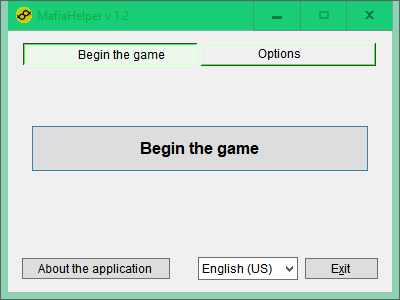
When you start the app, similar to the game itself, you’re prompted to specify the names of players and their roles. In reality, this is done using simple playing cards or special thematic cards. They’re distributed to players “in private”. Everyone (except the moderator) gets one role, which initially only he / she knows.
Next, zero night is announced, and all players close their eyes (usually with their hands or masks,
options are possible). The moderator takes turns interviewing the roles present in the game (except for
townspeople) in order to “get to know” the players who got them. The information received is entered
into the application.
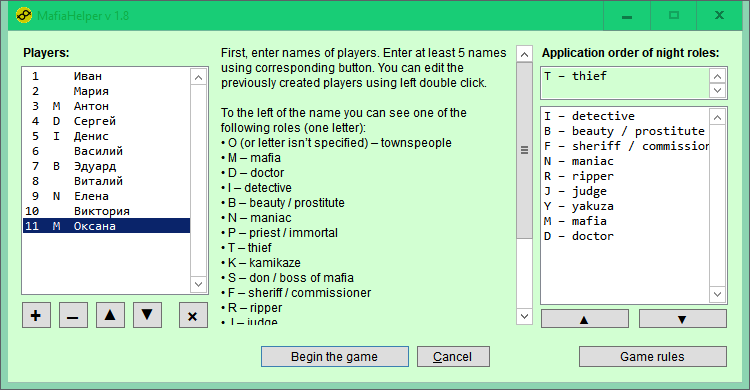
Then a zero day is announced (the app is not used), during which players implement representative functions related to the game process. The players see each other. This requires each of them to carefully simulate the absence of any special role.
The essence of the gameplay is the confrontation between civilians and the mafia. Each team strives to destroy the enemy. The psychological emphasis is on the confrontation between the organized minority (there are initially fewer mafia in the game, but players with this role recognize each other when they first meet and act together) and the unorganized majority (there are more civilians, but they don’t know about the roles of other players). Further actions are based on this.
The first night is announced (players close their eyes). The presenter takes turns interviewing
the roles (except for townspeople). The respective players open their eyes and point to some other
player (in some cases you can point to them or skip a turn) to whom they want to apply the action
of their role. The moderator makes appropriate notes in the app. Having completed the role, the player
closes his eyes.
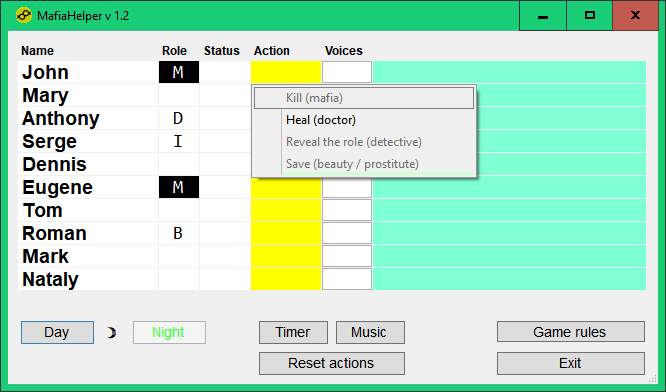
After interviewing all the roles, the moderator announces the first day. When this action is performed, the app processes the specified notes and displays the changed statuses of players.
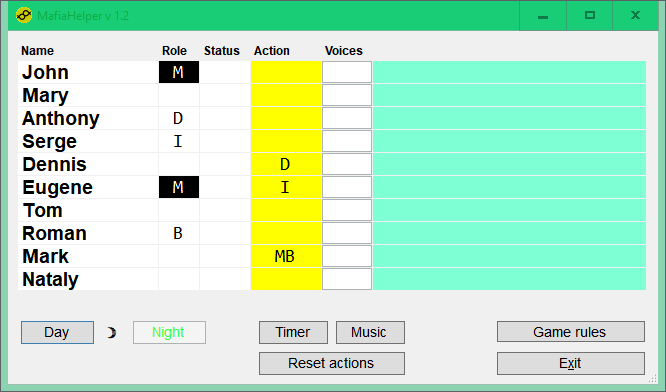
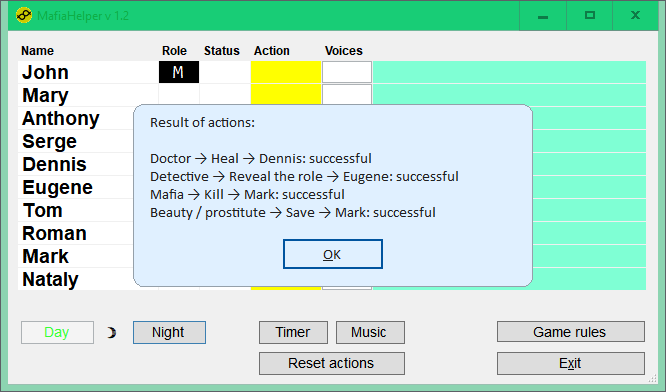
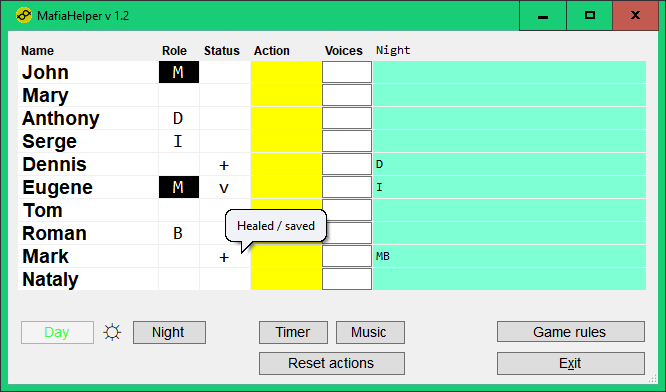
The moderator announces the changes that have occurred. Players use this information to discuss and make assumptions about who the mafia is and how other roles are distributed. Naturally, players can pretend and mislead each other in order to last longer in the game.
At the end of the day, a vote is held, based on the results of which one of the players is “executed” (he leaves the game). A corresponding note is made in the app. As a rule, a certain time is allocated for voting and discussion. If after its expiration the decision is not made, the “execution” is cancelled.
This is followed again by a night, during which actions similar to those described for the first night are performed, but with a changed composition of players. The cycle of day and night phases continues until a winning situation is achieved. For the mafia, a victory is considered to be the state when there are more players with this role than all the others combined (loss becomes mathematically impossible). Victory for civilians will only be the complete destruction of the mafia.
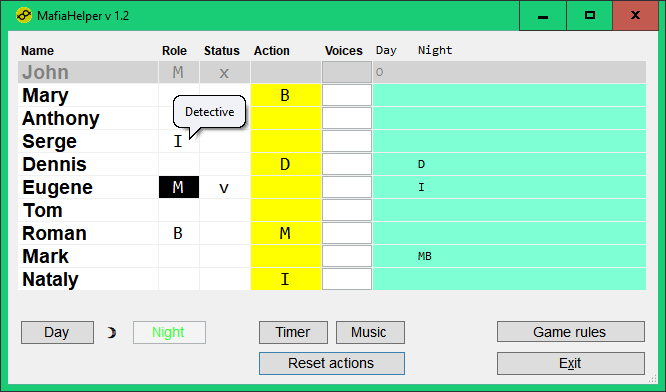
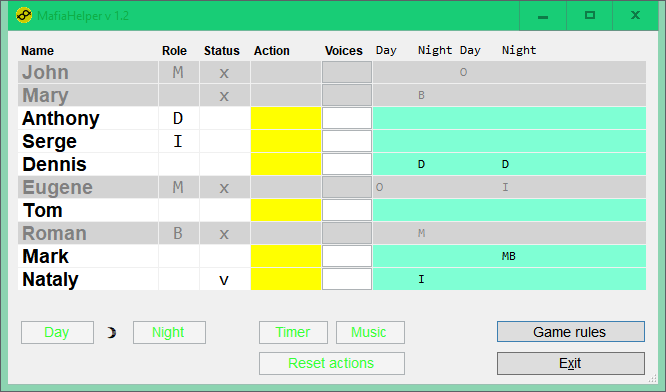
Implemented roles
In the current version, each role in the game is associated with one available action. Additionally, some roles have certain “abilities”.
Townspeople – an ordinary resident of the city, the main composition of the game. He always sleeps at night, therefore doesn’t know the roles of other players. During the day, by voting together with the rest of the “living” players, he can choose one player and “execute” him (such a player leaves the game). He has no other possibilities. Available on all days.
Mafia is an organized group of players opposing civilians (and yakuza). During the day, he can participate
in voting and discussion, imitating civilians or other roles. At night, he can choose one player
to “kill”. Available on all nights.
Yakuza is the same role as mafia but works as another one team of players (opposing both civilians and mafia).
Doctor – a civilian. Action at night – saving the specified player from “murder” (prevents mafia, yakuza,
sheriff and ripper action).
Available on all nights.
Detective – a civilian. Action at night – finding out the role of the specified player (the moderator
tells him with signs whether the specified player belongs to the mafia or not). He can use the collected
information in the day’s discussion. Roles of the mafia boss and the yakuza boss cannot be revealed (the moderator will
give a “civilian” sign). Detective may become a sheriff if the sheriff dies first. Available on all nights.
Prostitute / beauty – a conditionally civilian. Action at night – saving the specified player
(prevents mafia, sheriff and ripper action). But, unlike the doctor, if a player
with this role dies (killed by mafia or ripper), he “takes with him” the player he saved.
Maniac – a conditionally civilian. Action at night – remove a living player from the vote. The victim cannot vote for the next day.
Priest / immortal – a civilian. Has no effect. Can be killed only in three cases:
- when his role is stolen by a
thief; - when he ended up with a
beautywhom themafiaorrippercame to; - when a
kamikazepoints at him.
Thief – a conditionally civilian. The action at night is to “disable the role” of the specified player.
The victim doesn’t know that her role has been “stolen” and acts as usual. But her actions will not have
an effect during the current night (the doctor and the beauty will not be able to save, the detective
will receive the wrong answer from the moderator, the priest will lose protection, the maniac will not
change the victim’s condition).
In relation to the mafia, the use of the role is controversial, because it is represented by several players.
In order for the role to work, it is the first called role in the app.
Kamikaze – a conditionally civilian. The action during the day is to destroy one player along with himself (both players leave the game). Usually has a spontaneous character, that is, it’s a source of randomness in the game.
Don / mafia boss – part of mafia. He doesn’t have a separate action; he plays the role of the mafia
in composition. Boss is protected from disclosure of the role by the detective. He is counted as a mafia when
determining the victory of one of teams.
Oyabun / yakuza boss – the same role as mafia boss but for yakuza.
Sheriff – a civilian. Action at night – killing mafia members. If he “hits” civilians, his role doesn’t work. Available on all nights.
Ripper – a conditionally civilian. The action at night is to destroy one player (unlike the kamikaze,
he himself doesn’t leave the game). He also has a spontaneous character, that is, it’s a source of randomness in the game.
Judge – a civilian. The action at night is to protect one player from execution. The next voting will take no effect on the protected player.
The following are allowed in the game:
- at least one, but not more than 50% of players with the
mafiarole (including themafia boss); - not more than 50% of players with
mafiaandyakuzaroles (combined, including bosses) ifyakuzais presented; - no more than one player in any role other than
townspeople,mafiaandyakuza; - unlimited number of
townspeople(those left without a special role).
Features of the application
The initial application interface allows you to:
- select the interface language;
- configure app notifications;
- set the number of the first night when non-default roles (other than
townspeople,mafia,detective,doctorandsheriff) become playable; - specify the directory with the background music;
- access a full range of app and Lab help and support resources.
The interface for entering names and roles of players performs:
- managing, saving and ordering of players names;
- independent control of the distribution of roles and the correctness of the input. In this case, the specified names are remembered for use in the next game, and the specified roles are reset after exiting the current session.
- processing the specified order of application of roles.
The gaming activity tracking interface has the following capabilities:
- displaying tooltips when you hover over abbreviations in the “roles” and “statuses” columns;
- displaying of changing player statuses and sequence with color indication;
- displaying a dynamic context menu when pressing buttons in the “actions” column, which contains only those actions that are currently available;
- obvious transition between day and night phases with display of actions performed and their results;
- control of intersecting rules;
- control of timer with several preset intervals and audible alarm;
- launch a random music track from the directory specified in the app settings (for night phases);
- collecting completed actions in a timeline;
- watching the game log in the build-in viewer;
- displaying messages about incorrect application of roles;
- displaying messages about team win / loss